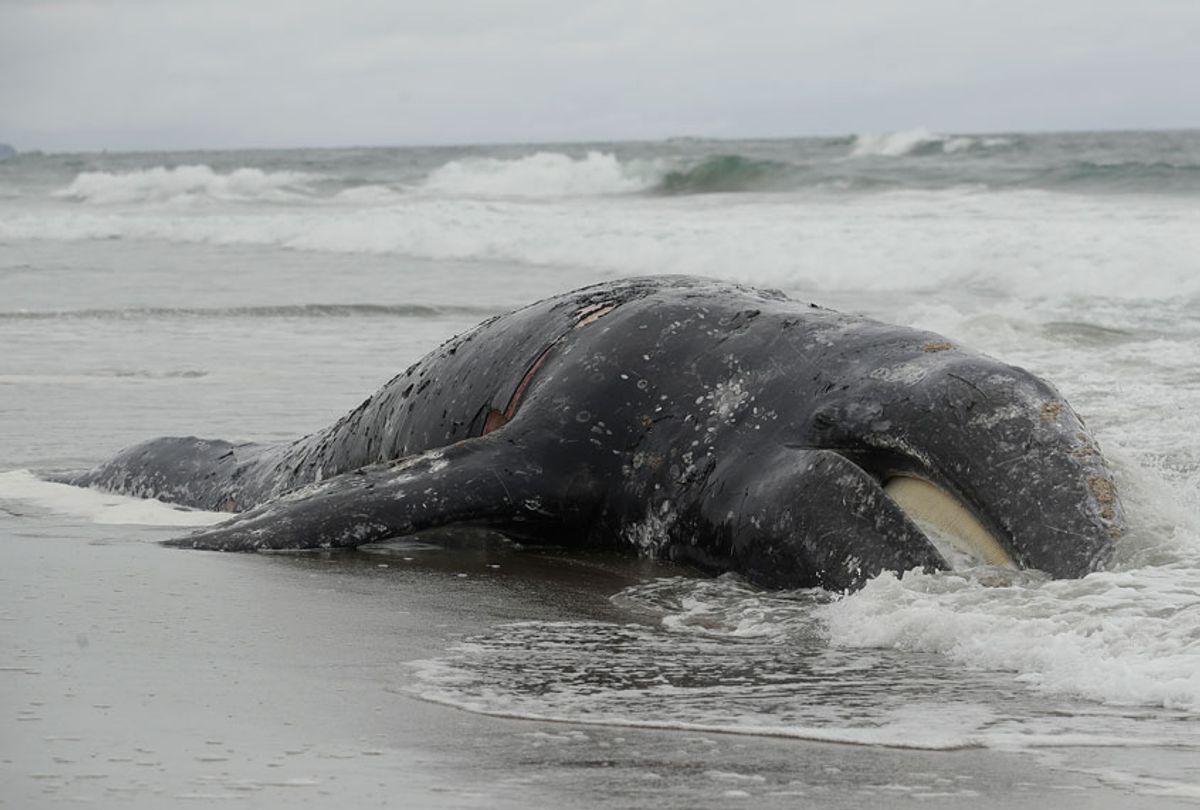A 41-foot long female gray whale washed up on Ocean Beach in San Francisco last Monday, marking the ninth dead whale to be found in the San Francisco Bay Area since March. The news is particularly foreboding in light of this week's United Nations report that around one million species may face extinction in the next fifty years due to climate change and warming oceans caused largely by human activity.
Four of the nine Bay Area whale deaths studied by the Marine Mammal Center were determined to have been caused by malnutrition. Three were ship strikes. The most recent gray whale death is likely to have also been via ship strike, and another whale's cause of death still remains undetermined. The San Francisco Bay Area’s unusually high number of deaths deaths follows a rising trend along the West Coast, which has surpassed 30 whale deaths so far, the highest for this time of year since 2000.
The Marine Mammal Center says it is noticeable that gray whales are in poor condition during year’s migration, and they suspect they might be having issues finding food. It is possible warming ocean conditions are impacting the food supply, or there is not enough food to accommodate their growing population, marine scientists believe.
“By investigating deaths like this, we are able to identify and respond to rapidly changing environmental trends that are impacting marine mammal populations,” said Dr. Padraig Duignan, Chief Research Pathologist at the Marine Mammal Center. “These animals are representative of a growing issue for migrating gray whales who appear unable to sustain themselves due to shifting food source availability.”
In addition to a higher number of whale deaths, there has been a rise in gray whales sighted in the San Francisco Bay. According to the Marine Mammal Center, experts have counted up to five entering the Bay at a time. Usually, only one or two pass underneath the Golden Gate Bridge during this time of year.
Bill Keener, a marine biologist at Golden Gate Cetacean Research, told Salon in March the number of gray whales entering the San Francisco Bay have not only been unusually high, but they were arriving earlier, too.
“This year gray whales were first seen in mid-February, and we are talking about multiple whales, like five at a time, and some aren’t leaving,” he said. “I just this morning was just able to identify a whale that has been in the Bay since February 17.”
The Marine Mammal Center said it is crucial to better understand why these whales are dying and what is impacting their food supply.
“It is critical for scientists to conduct in-depth necropsies to better understand why animals are dying,” The Marine Mammal Center said in a media statement. “Whales and other marine mammals face numerous human-caused threats and solutions must be found to protect healthy and vulnerable species alike.”
The statement continued: “Climate change affects water temperatures and prey availability, leading to shifting food sources for marine mammal populations and other marine species.”
Scientists have been persistently warning that global warming can impact ocean temperatures and marine life in a detrimental way. The Arctic Ocean is experiencing many environmental changes due to climate change, and for many of the gray whales, feeding occurs almost exclusively during the summer season in the Bering Sea. The food they eat is stored in their blubber for the migration season, which could be why scientists are observing more malnourished gray whales. Scientists believe the gray whale migration is the longest made by any mammal on Earth, totaling between 10,000 and 13,600 miles round trip each year.



Shares